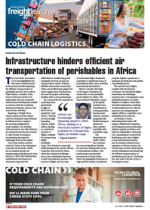A second tracking trial of perishables undertaken by the Perishable Products Export Control Board (PPECB) on behalf of and as a member of the Cool Chain Association (CCA) has identified significant areas where action can be taken to reduce food loss. The trial is part of an ongoing project to develop best-handling practice guidelines for perishables.According to a spokesperson from the CCA, the PPECB conducted the tracking of raspberry consignments from South Africa to the United Kingdom (UK) as part of an ongoing collaboration with the CCA. The objective of this project is to identify challenges in the cold supply chain and develop best practices for handling perishable goods.The results of the second trial indicate that the time it takes to cool the berries to a temperature of approximately 50C, known as the cut-to-cool time, should be reduced to within 60 minutes after harvest. This adjustment is crucial for maintaining the quality of the berries during storage.Furthermore, the trial suggested that blast cooling should be done at a lower air temperature of 00C, instead of the current 20C. This change in cooling temperature is recommended to enhance the preservation of the raspberries.Due to their short shelf life, raspberries can only be transported by airfreight. However, their delicate nature makes them susceptible to damage during transportation.Targeting improved handling for raspberriesThe goal of this trial is to optimise the quality of raspberries in the market by improving current handling processes and aligning airfreight cold chain management protocols with those used for sea freight.The trial involved the export of raspberries from a farm in Cape Town, which accounts for approximately 85% of raspberry production for the export market, to the UK.“Approximately 30% of all berry exports from South Africa to market have quality defects,” said Vijan Chetty, PPECB general manager. “In order to mitigate this food loss, we need further research and trials into how handling practices can be optimised.”He said with two trials now completed, results showed that several actionable measures could be taken to protect product integrity. Continued research would assist the CCA to hone a best practice framework to prevent spoilage and waste in the perishables supply chain.The first trial undertaken earlier in 2023 monitored cut f lower exports from South Africa to Europe and also highlighted the impact of temperature excursions on vase life. This trial was conducted in collaboration with South African wholesale f lower nursery and exporter, Arnelia Farms, and followed a consignment of Sunshine Conebush f lowers from the farm near Hopefield in the Western Cape where they were packed to the final destinations in the Netherlands and Germany.Final mile focusAccording to Chetty, most trials undertaken over the past few years have focused primarily on the final mile of a specific trade lane. The PPECB trials, however, have looked at farm-to-table or vase across a trade lane, and not only focused on monitoring the temperature of the product, but also aimed to identify all areas where shelf life could be inf luenced, including, for example, post-harvest practices, packaging and palletisation, and the functionality of cold storage.The raspberry trial, for example, assessed a number of factors, including the quality of raspberries on the farm, temperature management throughout the trade lane, handling processes, and a final quality evaluation on arrival at the end destination.It was found that temperature f luctuations in the packhouse, in f light, and at the destination handling facility, while unavoidable, should be significantly reduced in duration to further minimise the incidence of quality defects.According to Chetty, future research will see timed temperature tolerance trials performed to determine the duration of exposure to a particular temperature beyond which berry quality and shelf life are compromised.Additional investigation to measure the internal temperature of the fruit, which changes more rapidly than external air temperature, may also be conducted, as well as deeper research into handling protocol upon arrival.

